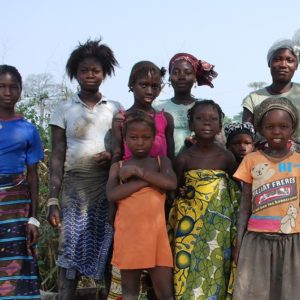Date: May 2018 - November 2018
Client: Deutsche Gesellschaft für Internationale Zusammenarbeit (GIZ)
Raw Materials: Diamonds
Location: International; case studies in Côte d’Ivoire, Sierra Leone
Challenge
The Kimberly Process (KP) is a global tri-partite initiative between governments, civil society and industry to stop the trade in 'conflict diamonds’. The Kimberley Process Certification Scheme (KPCS) is seen as a unique conflict-prevention instrument to promote peace and security. Its purpose is to ensure that rough diamonds are not being used to fund armed conflict. KP compliance is an important consideration in the responsible mining and sourcing of diamonds.
The KP currently has 54 participating members (‘Participants’ hereafter), representing 81 participating countries.
To date, very little attention has been paid to gender dimensions within the KP. The broad scope of the KP’s work and its status as an influential multi-stakeholder initiative give it significant potential for positive gender impact in multiple geographies and stages of the supply chain, but this opportunity has not been fully capitalised on.
Solution
To better understand the roles of women in Artisanal and Small-scale Diamond Mining (ASDM), and to increase the KP’s contribution to achieving the Sustainable Development Goals (in this case focusing on Goal 5: Gender Equality), Deutsche Gesellschaft für Internationale Zusammenarbeit (GIZ)`s sector program Extractives and Development, on behalf of the German Federal Ministry for Economic Cooperation and Development (BMZ), sought to provide direction and justification for gender advocacy in the KP on international and local levels.
Levin Sources was contracted by GIZ to conduct in-country stakeholder engagement to establish a guidance document that informs KP stakeholders in programming and implementation of the KPCS in host countries. The work included field studies in Sierra Leone and Côte d’Ivoire, a comprehensive consultation programme for stakeholder feedback to sense-check the findings and assist in the development of concrete recommendations, and a roadmap for knowledge management and follow-up activities.
Stakeholder engagement and research for the project was completed by Levin Sources’ local partners in Sierra Leone and Côte d’Ivoire. The engagement conducted primarily focused on the:
- Level of female participation in artisanal diamond supply chains
- Key barriers to greater female participation
- Areas where the KP could influence greater gender inclusion according to the countries’ specific contexts and challenges
Contextualised by in-depth desk-based research, findings were distribution amongst key stakeholders and area experts. To maximise participation, Levin Sources developed accessible consultation reports and an executive summary document for distribution at conferences, conducted a capacity building webinar and joined representatives from Tetra Tech ARD, the EU Service for Foreign Policy Instruments, GIZ and the World Diamond Council on a panel at the European Development Days 2018 – the theme of which was ‘Women and Girls at the Forefront of Sustainable Development: Protect, Empower, Invest’.
Results
The outputs of the study were thus:
- Global Policy Dimension Briefing Document: Practical recommendations for how the Kimberley Process (KP) can promote gender equality through its work
- Local Policy Dimension Briefing Document: Case studies focusing on the roles of women in Artisanal and Small-scale Diamond Mining (ASDM) in Sierra Leone and Côte d’Ivoire
By developing practical recommendations for how the KP can promote gender equality through its work, the results of the studies helped build a clearer picture of an often-misunderstood area of ASDM.
Full recommendations will be available in forthcoming publications by GIZ.
Findings and recommendations from the study were presented on a panel at European Development Days 2018. A podcast featuring a recording of the panel session is available to listen to.



